Research - (2021) Volume 9, Issue 1
Survey on Career over Passion Among Dental Students
Aarthi Kannan, Dhanraj Ganapathy* and Keerthi Sasanka
*Correspondence: Dhanraj Ganapathy, Department of Prosthodontics, Saveetha Dental College and Hospitals, Saveetha Institute of Medical and Technical Sciences, Saveetha University Tamilnadu, India, Email:
Abstract
Passion also technically means “suffer”. So whatever a person is willing to sacrifice and suffer for is his passion. Pursuing the passion indeed helps us feel the satisfaction. Choosing our passion might sometimes not turn out the way we expect, but in the long run it will. Motives for choosing a career are complex, and a choice of dentistry as a career is no exception. Many factors may enter while deciding on a career choice. These include factors relating to work conditions and financial rewards. Harmonious passion is an optimal passion where an individual feels as if he or she has control over an activity, and that feeling of control contributes to positive psychological outcomes this was a cross- sectional study. A well-structured questionnaire comprising 11 questions covering the socio-demographic information, knowledge, attitude, perception was framed, administered and circulated to college students through an online survey link. The sample size was 100 dental students. Data was analyzed and determined through pie charts. In conclusion, we examined the choice of interests of the students on career over passion. On surveying, it was evidence that the majority of the population was forced into this profession, and chose this career based on money. Hence it is important to improve the knowledge, perception and attitude of the participants towards choosing careers.
Keywords
Career, Passion, Parents, Money, Profession
Introduction
Passion for an activity is defined as “a strong inclination toward an activity that people lie, that they find important and in which they invest time and energy”. Passion also technically means “suffer”. So whatever a person is willing to sacrifice and suffer for is his passion. Pursuing the passion indeed helps us feel the satisfaction. Choosing our passion might sometimes not turn out the way we expect, but in the long run it will. Passion can push you through difficult times because you don't care what it takes to become better [1]. Most people engage in an activity about which they are passionate, and individuals can be passionate about a seemingly infinite number of activities. The secret to living the dream is hidden in our passions and what we do because of them. Well - being issues are increasing amongst dental students [2]. Social relationships can be important for student support during their studies. Hence family and friends support is very important in this process [3]. Motives for choosing a career are complex, and a choice of dentistry as a career is no exception. Many factors may enter while deciding on a career choice. These include factors relating to work conditions and financial rewards, security and status, nature of occupation [4].
Motivations for choosing dentistry have been studied in many countries such as France, Middle East. Factors which influence their future careers include: vocational training, opportunities for specialization or developing special interests and policy- related issues together with wider professional and social concerns. The dental students may scenario due to the growing competition [5].
Harmonious and obsessive passions are associated with distinct psychological outcomes. Individuals who report harmonious passion tend to report more well- being and positive affect while they engage in their preferred activity and less disappointment when unable to engage in the activity [6]. Previous research findings so suggest that passion affects behavioral outcomes in addition to psychological outcomes. It is also possible that students could be taught to identify their strengths and passions to make their academic experience in college more meaningful. It has been examined if a student’s passion for academic activities and for undergraduate major predicts engagement in problematic health behaviors [7].
Given the changing nature of the dental workforce, and the need to retain the services of future members, it is important to understand why current dental students perceive that they were motivated to study dentistry. Qualitative research provides the opportunity to explore the underlying issues in addition to informing subsequent quantitative research [8].Previously our department has published extensive research on various aspects of prosthetic dentistry [9-18]. The aim of the present is to determine the choice of career over passion among dental students.
Materials and Methods
A well-structured questionnaire comprising 11 questions covering the socio-demographic information, knowledge, attitude, perception was framed, administered and circulated to college students through an online survey link. The sample size was 100 dental students. The questions were carefully studied and the corresponding answers were marked by the participants. The data was collected and statistically analysed.The data collected were tabulated using excelling sheets and then appropriate statistics was done using Microsoft excel software. Each output variable was collected as ordinal data and the data represented as pie charts. The Sampling method used was Simple randomised sampling. The independent variables are college students and the dependent variables are knowledge, attitude, practice and perception. The statistics used in this study Descriptive statistics.
Results and Discussion
Survey on career over passion, given the sample size of about 100 dental students gave the result as 87.8% of the population did not like their profession (Figure 1). 58.2% of the population were forced into dentistry, 41.8% of the population were not forced (Figure 2). 72.7% of the population responded that they would prefer other careers over dentistry (Figure 3). Besides choosing dentistry, 46.3% of the population preferred medicine, 23.2% of them preferred nursing, 18.9% of them preferred engineering and 11%- physiotherapy (Figure 4). 59% of the population chose their career based on money (Figure 5). 75% of the population preferred passion over career (Figure 6). Among the total population 60% of them responded doing what they like brings happiness, and 25% felt that money brings happiness whereas, 15% felt that fulfilling parent’s wish brings happiness (Figure 7). 67% of the population regretted choosing dentistry as their profession (Figure 8). 78% of the population was influenced by their parents in choosing their career (Figure 9). 74% of the population responded that peer pressure was one of the cause for choosing this career (Figure 10). 91% of the population felt that they will be successful in this profession (Figure 11).
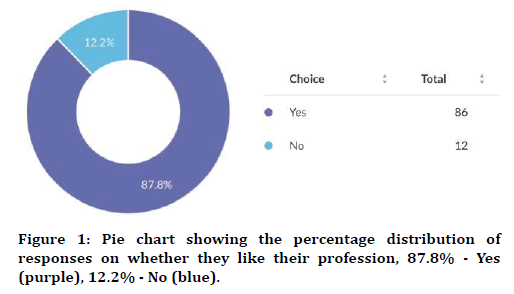
Figure 1. Pie chart showing the percentage distribution of responses on whether they like their profession, 87.8% - Yes (purple), 12.2% - No (blue).
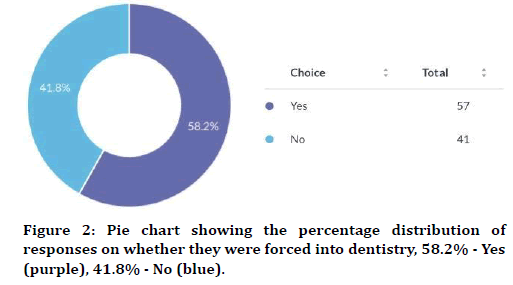
Figure 2. Pie chart showing the percentage distribution of responses on whether they were forced into dentistry, 58.2% - Yes (purple), 41.8% - No (blue).
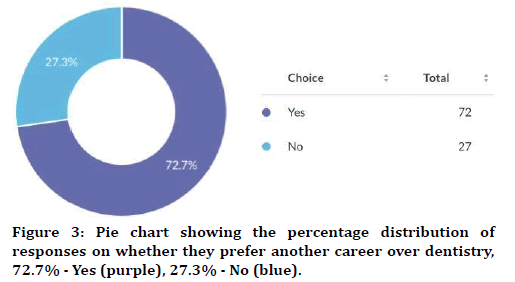
Figure 3. Pie chart showing the percentage distribution of responses on whether they prefer another career over dentistry, 72.7% - Yes (purple), 27.3% - No (blue).
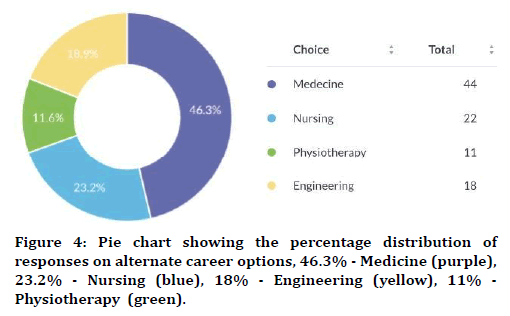
Figure 4. Pie chart showing the percentage distribution of responses on alternate career options, 46.3% - Medicine (purple), 23.2% - Nursing (blue), 18% - Engineering (yellow), 11% - Physiotherapy (green).
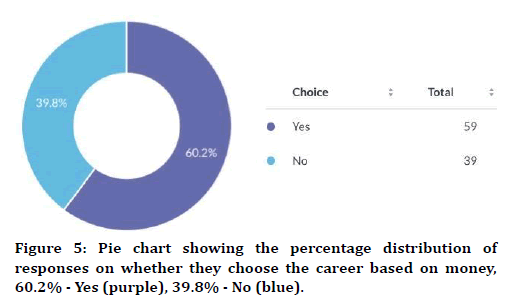
Figure 5. Pie chart showing the percentage distribution of responses on whether they choose the career based on money, 60.2% - Yes (purple), 39.8% - No (blue).
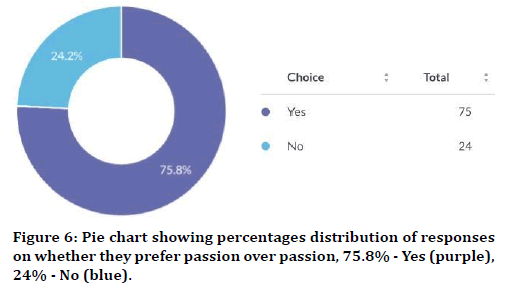
Figure 6. Pie chart showing percentages distribution of responses on whether they prefer passion over passion, 75.8% - Yes (purple), 24% - No (blue).
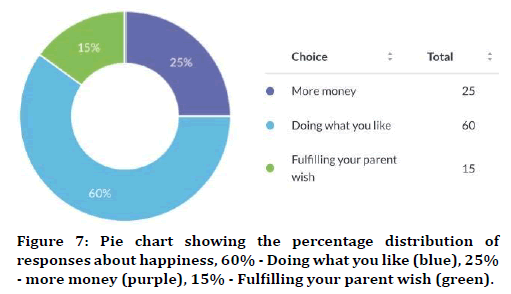
Figure 7. Pie chart showing the percentage distribution of responses about happiness, 60% - Doing what you like (blue), 25% - more money (purple), 15% - Fulfilling your parent wish (green).

Figure 8. Pie chart showing the percentage distribution of responses on whether they regret choosing this profession, 69% - Yes (purple), 30.2% - No (blue).
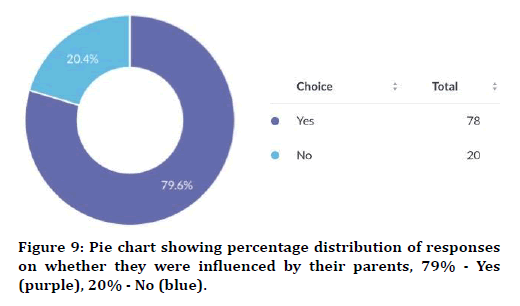
Figure 9. Pie chart showing percentage distribution of responses on whether they were influenced by their parents, 79% - Yes (purple), 20% - No (blue).
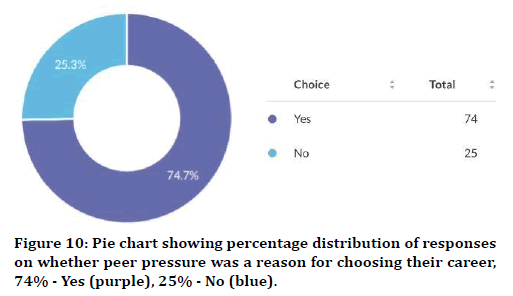
Figure 10. Pie chart showing percentage distribution of responses on whether peer pressure was a reason for choosing their career, 74% - Yes (purple), 25% - No (blue).
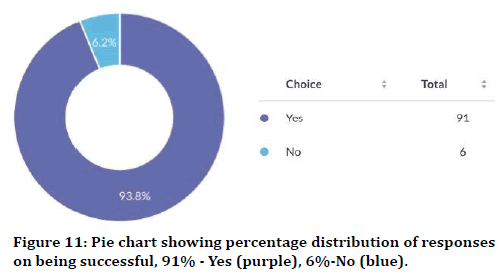
Figure 11. Pie chart showing percentage distribution of responses on being successful, 91% - Yes (purple), 6%-No (blue).
In 2013, Lois Gellar stated that success requires more than passion- leadership, hard work, and courage. Also stated that a lot of passion can be misguided, especially when people think passion is enough [19]. According to another previous article, aimed to determine the motives and perception of undergraduate and postgraduate dental students. It was concluded that the majority of the students indicated that dentistry was not their first choice of career. Which is similar to the present study as many of the participants had other career preferences before dentistry [20]. The article which was published by Amit Aggarwal, where the study was conducted in four private dental institutions in India and was designed to investigate dental students' motivations in their choice of dentistry as a career and their perceptions regarding dentistry in India. He stated that 38.7% of the students chose dentistry because the profession is highly paid, which is similar to the present study as 59% chose this career based on money [21]. According to a previous study done by Capranzano, amined to understand that women were better at selecting international cardiology as a career path. He concluded the article, stating that there are several barriers that preclude women from choosing their passion due to lack of opportunity, etc. Hence, we require new strategies to support the growth of women [22]. In 2006, Jover aimed to evaluate the representations odontology students had of their career path. He concluded that article stating that the students who had not planned to become dentists before the selection needed some time [23].
Limitations and Future Scope
Although the study was conducted by following the protocols there are certain limitations in this study like less sample size, this is an online survey which may lead to respondents bias, error in sampling and selection of respondents, survey fatigue.. This survey will help in assessing the knowledge and creating awareness about the choice of interests of people on choosing career over passion, can include organisation of study workshops and programs for parents and students which will help in the proper guidance. Hence it is important to improve the knowledge, perception and attitude of the participants towards choosing careers.
Conclusion
In conclusion, we examined the choice of interests of the students on career over passion. On surveying, it was evidence that the majority of the population was forced into this profession, and chose this career based on financial status.
Acknowledgment
This research was done under the supervision of the department of research of Saveetha Dental College and Hospitals. We sincerely show gratitude to the corresponding guides who provided insight and expertise that greatly assisted the research.
Conflict of Interest
The author has none to declare.
References
- Arana A, Satur J, Mariño RJ. Career paths in organised dentistry and international organisations. Career Paths in Oral Health 2018; 115-124.
- Brooks J. How to develop your career in dentistry. John Wiley & Sons 2015.
- Johnson I, Jenkins S, Ginley J. Dentistry: Studying for a chosen career and the role of family, friends and support in that journey. Eur J Dent Educ 2020; 24:335-40.
- Garla BK. Career aspirations and reasons for choosing dentistry as a career-a survey of dental students in gandhi dental college and hospital, Bhubaneswar. Ann Essences Dent 2011; 3:108-110.
- Hong R. Finding passion in work: Media, passion and career guides. Eur J Cultural Studies 2015; 18:190–206.
- Passion for “building things” drives prosthetics career. Psyc EXTRA Dataset 2009.
- https://www.goodreads.com/book/show/46001418-is-dentistry-your-destiny
- Gallagher J, Clarke W, Wilson N. Understanding the motivation: a qualitative study of dental students’ choice of professional career. Eur J Dent Edu 2008; 12:89-98.
- Begum R, Ariga P, Jain AR. Evaluation of corrosive behavior of four nickel–chromium alloys in artificial saliva by cyclic polarization test: An in vitro study. World J Dent 2017; 8:477-482.
- Kannan A. Effect of coated surfaces influencing screw loosening in implants: A systematic review and meta-analysis. World 2017 8:496-502.
- Jain AR. Clinical and functional outcomes of implant prostheses in fibula free flaps. World J Den 2017; 8:171–176.
- Jain AR. Prevalence of partial edentulousness and treatment needs in rural population of South India. World J Dent 2017; 8:213–217.
- Ariga P. Determination of correlation of width of maxillary anterior teeth using extraoral and intraoral factors in indian population: A Systematic review. World J Dent 2018; 9:68–75.
- Gupta P, Ariga P, Deogade SC. Effect of monopoly-coating agent on the surface roughness of a tissue conditioner subjected to cleansing and disinfection: A contact profilometric In vitro study. Contemporary Clin Dent 2018; 9:S122.
- Anbu RT, Suresh V, Gounder R, ET ALet al. Comparison of the efficacy of three different bone regeneration materials: An animal study. Eur J Dent 2019; 13:22.
- Ashok V, Ganapathy D. A geometrical method to classify face forms. J ORAL biol Craniofa Res 2019; 9:232-235.
- Duraisamy R, Krishnan CS, Ramasubramanian H, et al. Compatibility of nonoriginal abutments with implants. Implant Dent 2019; 28:289–295.
- Varghese SS, Ramesh A, Veeraiyan DN. Blended module‐based teaching in biostatistics and research methodology: A retrospective study with postgraduate dental students. J Dent Educ 2019; 83:445-450.
- Lindberg J. Touch and passion: Unlocking the power of the lute. Early Music 2013; 41:298-300.
- Rashmi M, Virjee K, Yadava TS, et al. Dentistry as a career: Motives and perception of dental students attending dental colleges in Bengaluru city, Karnataka, India. J Indian Assoc Public Health Dent 2014; 12:194.
- Aggarwal A, Mehta S, Gupta D, et al. Dental students’ motivations and perceptions of dental professional career in India. J Dent Educ 2012; 76:1532-1539.
- Capranzano P, Kunadian V, Mauri J, et al. Motivations for and barriers to choosing an interventional cardiology career path: Results from the EAPCI women committee worldwide survey. Euro Intervention 2016; 12:53-59.
- Jover M, Doudoux D, Deveaux E. Representations of the dental surgery profession and the motivations given by second‐year French students for applying for dental surgery. Eur J Dent Educ 2006; 10:2-9.
Author Info
Aarthi Kannan, Dhanraj Ganapathy* and Keerthi Sasanka
Department of Prosthodontics, Saveetha Dental College and Hospitals, Saveetha Institute of Medical and Technical Sciences, Saveetha University Tamilnadu, Chennai, IndiaCitation: Aarthi Kannan, Dhanraj Ganapathy, Keerthi Sasanka, Survey on Career over Passion Among Dental Students, J Res Med Dent Sci, 2021, 9 (1): 303-307.
Received: 23-Sep-2020 Accepted: 11-Jan-2021
